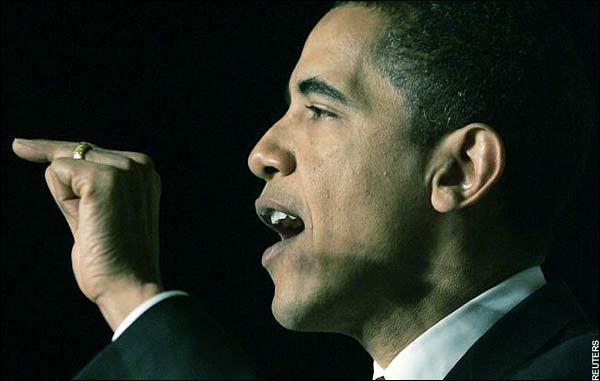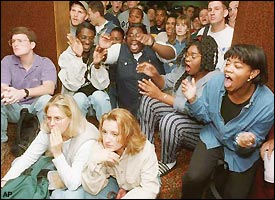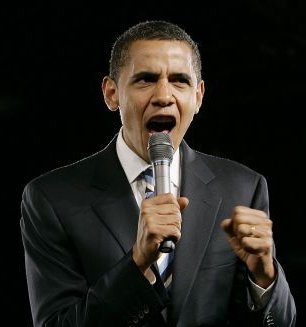Obama's ACORN Falls Right Next To Treefor
24-Hours of Propaganda Deadbeat Borrowers: America's #1 Economy Wrecker
Deadbeat Borrowers: America's #1 Economy Wrecker
What if Barack Obama’s most important radical connection has been hiding in plain sight all along?
Obama has had an intimate and long-term association with the Association of Community Organizations for Reform Now (Acorn), the largest radical group in America. Acorn is at least as radical as MoveOn.org or Code Pink, arguably more so. Yet because Acorn works locally, in carefully selected urban areas, its national profile is lower. Acorn likes it that way. And so does Barack Obama.
This is a story that has been largely missed. While Obama’s Acorn connection has not gone entirely unreported, its depth, extent, and significance have been poorly understood. Typically, media background pieces note that, on behalf of Acorn, Obama and a team of Chicago attorneys won a 1995 suit forcing the state of Illinois to implement the federal “motor-voter” bill. In fact, Obama’s Acorn connection is far more extensive. In the few stories where Obama’s role as an Acorn “leadership trainer” is noted, or his seats on the boards of foundations that may have supported Acorn are discussed, there is little follow-up. Even these more extensive reports miss many aspects of Obama’s ties to Acorn.
Michelle Malkin characterizes ACORN's social work as using billions in government subsidies "to organize for the purpose of registering dead people to vote, shaking down corporations and using the
race card as a bludgeon." "Looking for my free house!"
"Looking for my free house!"
Anti-Capitolist Radicals
Walk through just about any of the nation’s inner cities, and you’re likely to find an office of ACORN, bustling with young people working 12-hour days to “organize the poor” and bring about “social change.” The largest radical group in the country, ACORN has 120,000 dues-paying members, chapters in 700 poor neighborhoods in 50 cities, and 30 years’ experience. It boasts two radio stations, a housing corporation, a law office, and affiliate relationships with a host of trade-union locals. Not only big, it is effective, with some remarkable successes in getting municipalities and state legislatures to enact its radical policy goals into law.
Community organizing among the urban poor has been an honorable American tradition since Jane Addams’s famous Hull House dramatically uplifted the late-nineteenth-century Chicago slums, but ACORN and Addams are on different planets philosophically. Hull House and its many successors emphasized self-empowerment: the poor, they thought, could take control of their lives and communities through education, hard work, and personal responsibility. Not ACORN. It promotes a 1960s-bred agenda of anti-capitalism, central planning, victimology, and government handouts to the poor. As a result, not only does it harm the poor it claims to serve; it is also a serious threat to the urban future.
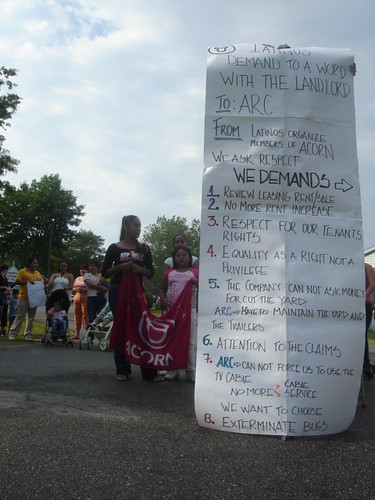 ARC's 2 Demands: 1. Pay Your Rent 2. Cut Your Grass.
ARC's 2 Demands: 1. Pay Your Rent 2. Cut Your Grass.It is no surprise that ACORN preaches a New Left–inspired gospel, since it grew out of one of the New Left’s silliest and most destructive groups, the National Welfare Rights Organization. In the mid-sixties, founder George Wiley forged an army of tens of thousands of single minority mothers, whom he sent out to disrupt welfare offices through sit-ins and demonstrations demanding an end to the “oppressive” eligibility restrictions that kept down the welfare rolls. His aim: to flood the welfare system with so many clients that it would burst, creating a crisis that, he believed, would force a radical restructuring of America’s unjust capitalist economy. The flooding succeeded beyond Wiley’s wildest dreams. From 1965 to 1974, the number of single-parent households on welfare soared from 4.3 million to 10.8 million, despite mostly flush economic times. By the early 1970s, one person was on the welfare rolls in New York City for every two working in the city’s private economy. Yet far from sparking a restructuring of American capitalism, this explosion of the welfare rolls only helped to create a culture of family disintegration and dependency in inner-city neighborhoods, with rampant illegitimacy, crime, school failure, drug abuse, non-work, and poverty among a fast-growing underclass.
Even Wiley came to see that cramming millions more single mothers and their kids onto the welfare rolls would not produce the desired socialist utopia. Seeking new worlds to conquer, he sent one of his young lieutenants, Wade Rathke, to Little Rock, Arkansas, to launch a new community-organizing group: ACORN. The new group was to build a broad constituency of low-income and working-class people to agitate for social change.
The little ACORN that Wiley planted in the Arkansas soil flourished. As Rathke expanded it into a national organization, the “A” in its name—Arkansas Community Organizations for Reform Now—came to stand for “Association of” instead of “Arkansas.” And as it grew, it retained the core assumptions of the old New Left but radically transformed the New Left’s methods to produce something truly original.
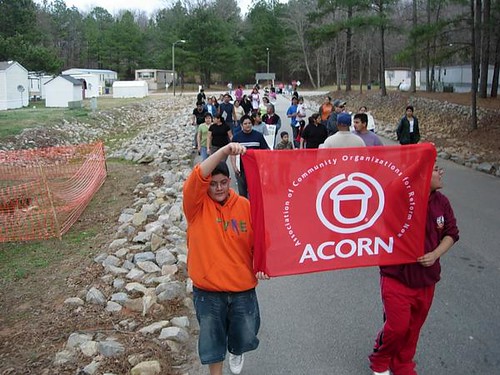 You will be seeing a lot of this soon.
You will be seeing a lot of this soon.
ACORN’s bedrock assumption remains the ultra-Left’s familiar anti-capitalist redistributionism. “We are the majority, forged from all the minorities,” reads the group’s “People’s Platform,” whose prose Orwell would have derided as pure commissar-speak. “We will continue our fight . . . until we have shared the wealth, until we have won our freedom . . . . We have nothing to show for the work of our hand, the tax of our labor”—claptrap that not only falsifies the relative comfort of the poor in America but that also is a classic example of chutzpah, given ACORN’s origins in a movement that undermined the work ethic of the poor. But never mind—ACORN claims that it “stands virtually alone in its dedication to organizing the poor and powerless.” It organizes them to push for ever more government control of the economy, as if it had learned no lessons about the free-market magic that made American cities unexampled engines of job creation for more than a century, proliferating opportunity and catapulting millions out of misery.
But look beyond the stale rhetoric, and you’ll see that what is new in ACORN’s approach is its focus on the local rather than the national or the global. It is an ingenious approach, for the political culture of cities tends to be further to the left than the nation’s, making them less resistant to ACORN’s worldview. City legislators and local reporters are often less sophisticated than their national counterparts and have been slow to grasp how radical ACORN’s positions really are. Local urban business communities tend to be disorganized, their members focused on world or national affairs rather than what they take to be the grubby and trivial details of local politics. As a result, ACORN has managed to get enacted into law in city councils proposals that the U.S. Congress would laugh off the stage. ACORN’s strategy seems to be that if, working from the grass roots up, it can persuade enough localities from coast to coast to adopt its programs, the result will add up, in effect, to a national policy.
 "We the People Want Our Free Houses."
"We the People Want Our Free Houses."ACORN has perfected an in-your-face strategy that works effectively at capturing public attention and winning adherents in cities. ACORN’s revival of its Baltimore chapter is a textbook example of this style. Several years ago, a top ACORN organizer, Mitch Klein, injected a new aggressiveness into the Baltimore chapter. Underlings piled garbage in front of City Hall to protest lack of services in poor neighborhoods, wielded huge inflated rubber sharks to disrupt a bankers’ dinner, and—most controversially—staged a profanity-laced protest in front of Mayor Martin O’Malley’s home. “They unloaded a busload of people shouting pretty ugly things and scared the daylights out of my wife and kids,” an angry O’Malley complained. “I thought it was a pretty cruddy thing to do.” Baltimore city council member Lisa Joi Stancil sympathizes with ACORN’s political agenda but is uncomfortable with the group’s aggressive approach. “There are boundaries,” she told the Baltimore Sun, “and they don’t seem to have a problem crossing them.” But ACORN is unapologetic about its tactics. “We’re up in their face,” an ACORN representative enthused. (Despite—or perhaps because of—the intimidation, ACORN still gets $50,000 a year from the city of Baltimore to provide housing counseling to the poor.)
The notoriety ACORN gained from its belligerence boosted donations and swelled its local membership to today’s 2,200. Now the group aims to use this new clout to change the political calculus in Baltimore: it has successfully fought for a change in the city charter, rejiggering city council districts in ways that ACORN activists believe will make it easier for them to gain more control over the body.

ACORN has followed a similar script in Sacramento. The wide publicity it sparked when it took up the cause of hundreds of working-class tenants threatened with eviction by a Japanese real-estate company that sought to sell their apartment buildings brought donations flooding in, enabling ACORN to expand. Now wielding a $300,000 annual budget, it has become a force in the California state capital, where it recently pushed through legislation that makes it more difficult for landlords to evict tenants, for example.
In cities where ACORN has been entrenched for years, its relentless campaigns have forced local policies to the left. In Chicago, for instance, ACORN took on the administration of Mayor Richard Daley over a law to raise the pay of employees in firms doing business with the city. Although the advocacy group initially failed to win approval for its wage bill, which Daley strongly opposed, ACORN pursued the mayor tenaciously, picketing him as he welcomed delegates to the 1996 Democratic national convention and bursting into a closed city council meeting to garner publicity for itself. After three years, it won the bill it sought. ACORN used that victory as a catalyst in Chicago, which has become one of the organization’s most effective chapters. Last year, it successfully expanded the wage law in the city.

But in cities where the political culture already tilts way to the left, ACORN has scored its biggest victories. The group provides public officials in those places with a ready-made agenda and legislation that city councils can use right out of the box, so to speak. In Los Angeles, for instance, ACORN helped write and pass wage legislation just like the measure it imposed upon Chicago, and it succeeded in watering down welfare reform. In New York, when a term-limits law swept into power a new city council, ACORN was ready with a host of bills—from its trademark wage legislation to an anti-predatory-lending measure—that willing council members rushed into law.
As these examples make clear, there’s one further crucial respect in which ACORN departs from the old New Left’s playbook. Instead of trying to overturn “the system”—to blow it up, as George Wiley wanted to do—ACORN burrows deep within the system, taking over its power and using its institutions for its own purposes. Not only has ACORN worked to influence existing city councils and state legislatures; it has also thrown itself into municipal and state elections, claiming to have registered 500,000 new voters in low-income communities around the country. With the labor-union allies it has cultivated, it has even helped create new parties that have scored real successes. Chicago’s ACORN leader, for instance, won a seat on the Board of Aldermen as candidate of the leftist New Party. Similarly, in Little Rock, several ACORN members, including the group’s state chairman, have won election to the Board of Directors (as the city council is called) as members of the New Party, which shares ACORN’s member list, as well as its mantra of “Think locally, act locally,” the Arkansas Democrat-Gazette reports.
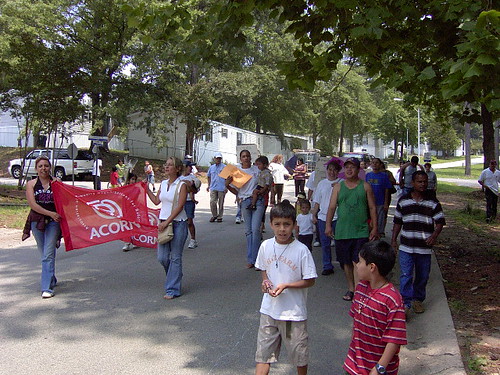 "Why should we pay rent? We are organized!"
"Why should we pay rent? We are organized!"New York houses the most successful of these parties, the Working Families Party, launched and co-chaired by local ACORN chief Bertha Lewis. The far-left party won 80,000 votes statewide in the last presidential election and 100,000 in the last U.S. Senate race—the strongest showing of any third party except for the Conservative Party. Working Families played a key role, too, in the unsuccessful recent Democratic campaigns of Carl McCall for governor and Mark Green for Gotham mayor, with Bertha Lewis organizing Green’s post-primary victory party. One-third of Gotham’s new city councillors ran with Working Families’ endorsement.
As part of its readiness to work within the system, ACORN makes use of the most establishment of mainstream private institutions as allies—everything from leftist charitable foundations, including the Abell and Tides Foundations, which shower it with grants, to mainstream churches and synagogues. For example, during a successful campaign in Los Angeles for its trademark wage legislation, ACORN helped organize Clergy and Laity United for Economic Justice (CLUE), a coalition of city congregations whose spiritual leaders tended to see “social justice” as religion’s central message. CLUE promoted the measure among congregants, sent religious delegations to the city council to push for the law, and cast opponents as Egyptians holding the chosen people in bondage. ACORN’s detailed and effective manual for organizers points out that mobilizing the religious community imparts the odor of sanctity to a left-wing social agenda. “Religious involvement highlighted the moral and theological reasons for a Living Wage,” the manual observes. Oppose the agenda, and you seem like part of an unholy alliance.
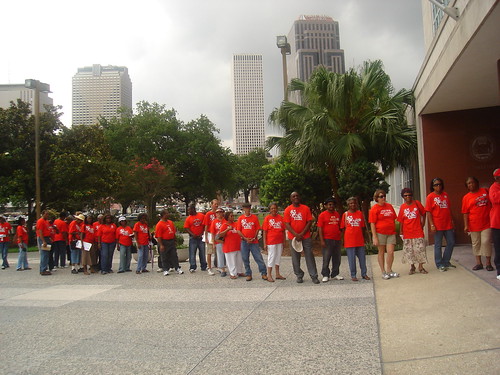
There’s nothing mainstream about that agenda, of course. ACORN’s specific policy prescriptions offer a job-killing recipe for urban blight and decline. Take, above all, ACORN’s signature “living-wage” legislation, which fully 80 cities have now adopted. This legislation requires that companies doing business with the city must pay their employees a minimum wage that is higher than the national minimum—often as much as one-third higher. The earlier versions of this law embraced only a handful of workers, while the later have included larger and larger numbers, ending with Santa Fe’s ordinance, passed just weeks ago, that covers all workers within the city and will hike the pay of a quarter of the private workforce. Clearly, unlike the old New Left, ACORN is patient, willing to achieve its goals by a thousand modest increments.
You can understand how living-wage legislation might seem reasonable to local legislators, so many of whom have never worked in the private economy. It puts money into the pockets of hardworking low-wage employees at no cost to the city treasury. To oppose it would make you seem like a fat-cat, top-hatted robber baron who relishes the oppression of starving workers. On the other side of the equation, how many city councilmen would understand the thick pile of studies from liberal as well as conservative economists showing conclusively that big hikes in the minimum wage ultimately kill low-wage jobs, as employers replace now-expensive receptionists with newly cost-effective voice-mail systems, say, or pile more duties onto experienced employees instead of hiring additional low-wage beginners? And how many councilmen would understand that increasing the costs of city contractors today will require them to raise the prices they charge the city tomorrow, requiring eventual tax hikes that will drive employers—and jobs—out of town to cheaper locales, isolating the poor who are left behind?
 "We want our Exit Visa Extortion Money!"
"We want our Exit Visa Extortion Money!"
ACORN clearly grasps that reality, however. Accordingly, the group wants to make it much harder for firms and middle-class taxpayers to escape the urban central planner’s grasp. ACORN promotes ideas like “sustainable development,” which would limit the growth of suburbs—so businesses and individuals can’t flee just beyond the city limits so easily—and “regional government,” which would force suburbs to share their tax revenues with cities, so that overburdened middle-class taxpayers can’t vote with their feet against the cities’ ever expanding social-democratic mini-welfare states.
At times, ACORN opts for undisguised authoritarian socialism, as when it proposes that “large companies which desire to leave the community” be forced to obtain “an exit visa from the community board signifying that the company has adequately compensated all its employees and the community at large for losses due to relocation.” How much longer before ACORN calls for exit visas for wealthy or middle-class individuals before they can leave a city? This is the road to serfdom indeed, even though it begins with little steps. The proposal gives a glimpse of the vastness of ACORN’s ambition, despite the seeming modesty of its individual programs. Understanding that ambition, seven state legislatures have passed laws to block municipalities from setting their own minimum wages.
 Save Your Home --> Pay Your Mortgage!
Save Your Home --> Pay Your Mortgage!As the living-wage movement demonstrates, the mere fact that a policy initiative claims to be “progressive” doesn’t mean that it actually helps the poor. ACORN’s current stand on welfare reform is almost as dramatic an illustration of that truth as founder George Wiley’s 1960s welfare-rights movement, which so grievously damaged its supposed beneficiaries. The 1996 welfare reform act, with its emphasis on personal responsibility and work, is one of the great social policy successes of recent decades. By bringing hundreds of thousands of former welfare clients into the mainstream economy, it has given them brighter prospects and new self-respect. With the national welfare rolls down by nearly 50 percent, child poverty has also declined, from 20.8 percent to 16.3 percent—rather than risen, as critics had darkly prophesied—and the anxiety levels of the teen children of working ex-welfare mothers have also diminished. You’d think that anyone dedicated to the genuine welfare of the poor would cheer.
Not ACORN. “There’s an emerging consensus that for those who can work, it should be encouraged,” ACORN’s national executive director Steven Kest conceeds, but work “should come with adequate supports, such as day care and transportation, to get people out of poverty.” He Continues: “We also still believe that, for a lot of people, it’s not right to force them to work. There should be some type of income support for those who still won’t be able to join the work force.” In other words: perpetual dependency.

The biggest “but” of all has been ACORN’s effort to unionize “workfare” workers—welfare recipients who, under the terms of welfare reform, must put in a certain number of hours of work at city agencies in exchange for their benefits. Though it hasn’t gotten everything it wanted, ACORN has successfully agitated for the creation of workfare grievance processes in Los Angeles and New York, and it seeks to expand rights and entitlements on all workfare jobs. All these efforts are subversive of reform: they send exactly the wrong message to welfare recipients, who aren’t really workers bargaining with their employers, after all, but recipients of charity. Encouraging them to resist and resent those who seek to help them, to file grievances against them and to feel victimized by them, undermines workfare’s purpose of teaching discipline and good work habits to people often deficient in such skills, without which it is hard to take advantage of the abundant opportunity that American society offers. There is nothing progressive about such “help.”
But with workfare, as with all aspects of welfare dependency, ACORN has never learned the most important lesson from the failures of 1960s radicalism—that there is a tight connection between irresponsible personal behavior and poverty. One can read hundreds of pages of ACORN pronouncements on the problems of inner-city neighborhoods without finding a word about how single-parent households have helped cause and perpetuate them.
“We are more focused on irresponsible behavior in the corporate sector,” executive director Kest has said. “I don’t think [illegitimacy] comes anywhere close to the irresponsible behavior of people running the largest businesses in this country”—as if the oppressiveness of “crime in the suites,” as Jesse Jackson likes to put it, causes, and thus excuses, self-destructive behavior in the streets.

ACORN’s anti-capitalism leads it to deep distrust of capitalism’s central instruments—the banks and other financial institutions that ACORN would class high among those “irresponsible . . . largest businesses.” ACORN loudly campaigns against “predatory lending,” “redlining,” and other forms of presumed abuse by financial institutions that supposedly hinder the minority poor from getting the capital needed for home buying and business start-ups. As an antidote, ACORN has latched on to a 1977 federal law, the Community Reinvestment Act (CRA), which was aimed at ensuring that banks do not discriminate against poor minority communities. Under its rules, banks must go through a costly process of reporting where and to whom they lend money, to show that they don’t discriminate. There are no official penalties for banks that get less than satisfactory ratings from the regulators on this issue. But when banks need approval for mergers or acquisitions, the CRA gives “community groups” the opportunity to lodge complaints against them, alleging suspect lending practices. If there’s even the appearance of discrimination, the regulators may put the bank’s deal on hold.
But if the CRA is now unnecessary, ACORN has found a use for it beyond wielding it as a propaganda tool to suggest that “redlining” still exists. ACORN has developed a lucrative niche as an “advisor” to banks seeking regulatory approvals. Thus we have J. P. Morgan & Company, the legatee of the man who once symbolized for many all that was supposedly evil about American capitalism, suddenly donating hundreds of thousands of dollars to ACORN. This act of generosity and civic-mindedness came, interestingly, just as Morgan was asking bank regulators for approval of a merger with Chase Manhattan. Not to be outdone, Chase also decided to grant more than $200,000 to ACORN.

The banks that ACORN has shaken down refuse to discuss their contributions to a political organization that, to put it mildly, is hostile to free enterprise. But one prominent consultant to the financial industry, who preferred to remain anonymous, admits: “The banks know they are being held up, but they are not going to fight over this. They look at it as a cost of doing business.” Some of ACORN’s fellow community activists are even blunter. “ACORN knows that corporate America has no starch in their shorts and, therefore, what they try to do is buy peace from groups that agitate against them,” says Robert L. Woodson, president of the National Center for Neighborhood Enterprise, a community-action group that stresses moral regeneration and individual responsibility rather than government handouts. “The same corporations that pay ransom to Jesse Jackson and Al Sharpton pay ransom to ACORN.”
Such opportunism fits an ACORN pattern. The group regularly takes actions that appear blatantly self-interested or hypocritical, as if their pure motives and laudable ends might justify less than elevated means. For example, even while pushing for living-wage legislation in California, ACORN was paying its workers less than the existing minimum wage—and arguing when the state sued it that the minimum-wage law infringed its First Amendment free-speech right, since paying workers more would hinder it in spreading its message. So, too, many of the living-wage laws it pushes exempt unionized companies from the legislation—a powerful tool for union-organizing efforts and a valuable gift to the unions that are ACORN’s biggest allies. A similar gift is ACORN’s effort to unionize workfare recipients and thus swell union membership rolls.
 “Look, I got two daughters — 9 years old and 6 years old...I am going to teach them first about values and morals, but if they make a mistake, I don’t want them punished with a baby.”
“Look, I got two daughters — 9 years old and 6 years old...I am going to teach them first about values and morals, but if they make a mistake, I don’t want them punished with a baby.”
What has Barack Obama got to do with all this? Plenty. Let’s begin with Obama’s pre-law school days as a community organizer in Chicago. Few people have a clear idea of just what a “community organizer” does. A
Los Angeles Times piece on Obama’s early Chicago days opens with the touching story of his efforts to build a partnership with Chicago’s “Friends of the Parks,” so that parents in a blighted neighborhood could have an inviting spot for their kids to play. This is the image of Obama’s organizing we’re supposed to hold. It’s far from the whole story, however. As the
L. A. Times puts it, “Obama’s task was to help far South Side residents press for improvement” in their communities. Part of Obama’s work, it would appear, was to organize demonstrations, much in the mold of radical groups like ACORN.
Although the
L. A. Times piece is generally positive, it does press Obama’s organizing tales on certain points. Some claim that Obama’s book, Dreams from My Father, exaggerates his accomplishments in spearheading an asbestos cleanup at a low-income housing project. Obama, these critics say, denies due credit to Hazel Johnson, an activist who claims she was the one who actually discovered the asbestos problem and led the efforts to resolve it.
Speaking up in defense of Obama on the asbestos issue is Madeleine Talbot, who at the time was a leader at Chicago ACORN. Talbot, we learn, was so impressed by Obama’s organizing skills that she invited him to help train her own staff.
And what exactly was Talbot’s work with ACORN? Talbot turns out to have been a key leader of that attempt by ACORN to storm the Chicago City Council (during a living-wage debate). On July 31, 1997, six people were arrested as 200 ACORN protesters tried to storm the Chicago City Council session. According to the
Chicago Daily Herald, ACORN demonstrators pushed over the metal detector and table used to screen visitors, backed police against the doors to the council chamber, and blocked late-arriving aldermen and city staff from entering the session.
Reading the
Herald article, you might think ACORN’s demonstrators had simply lost patience after being denied entry to the gallery at a packed meeting. Yet the full story points in a different direction. This was not an overreaction by frustrated followers who couldn’t get into a meeting (there were plenty of protestors already in the gallery), but almost certainly a deliberate bit of what radicals call “direct action,” orchestrated by ACORN’s Madeleine Talbot. As Talbot was led away handcuffed, charged with mob action and disorderly conduct, she explicitly justified her actions in storming the meeting. This was the woman who first drew Obama into his alliance with ACORN, and whose staff Obama helped train.
 These people definitely want to take stuff away from you and keep it for themselves.
These people definitely want to take stuff away from you and keep it for themselves. The extent of Obama’s ties to Acorn has not been recognized. We find some important details in an
article in the journal
Social Policy entitled, “Case Study: Chicago — The Barack Obama Campaign,” by Toni Foulkes, a Chicago ACORN leader and a member of ACORN’s National Association Board. The odd thing about this article is that Foulkes is forced to protect the technically “non-partisan” status of ACORN’s get-out-the-vote campaigns, even as he does everything in his power to give ACORN credit for helping its favorite son win the critical 2004 primary that secured Obama the Democratic nomination to the U.S. Senate.
Before giving us a tour of ACORN’s pro-Obama but somehow “non-partisan” election activities, Foulks treats us to a brief history of Obama’s ties to ACORN. Foulkes claims that ACORN specifically sought out Obama’s representation in the "motor voter" case, remembering Obama from the days when he worked with Talbot. And while many reports speak of Obama’s post-law school role organizing “Project VOTE” in 1992, Foulkes makes it clear that this project was undertaken in direct partnership with ACORN. Foulkes then stresses Obama’s yearly service as a key figure in ACORN’s leadership-training seminars.
At least a few news reports have briefly mentioned Obama’s role in training ACORN’s leaders, but none have said what Foulkes reports next: that Obama’s long service with ACORN led many members to serve as the volunteer shock troops of Obama’s early political campaigns — his initial 1996 State Senate campaign, and his failed bid for Congress in 2000 (Foulkes confuses the dates of these two campaigns.) With Obama having personally helped train a new cadre of Chicago ACORN leaders, by the time of Obama’s 2004 U.S. Senate campaign, Obama and ACORN were “old friends,” says Foulkes.
So along with the reservoir of political support that came to Obama through his close ties with Jeremiah Wright, Father Michael Pfleger, and other Chicago black churches, Chicago ACORN appears to have played a major role in Obama’s political advance. Sure enough, a bit of digging into Obama’s years in the Illinois State Senate indicates strong concern with ACORN’s signature issues, as well as meetings with ACORN and the introduction by Obama of ACORN-friendly legislation on the living wage and banking practices. You begin to wonder whether, in his Springfield days, Obama might have best been characterized as “the Senator from ACORN.”
 “The government gives them the drugs, builds bigger prisons, passes a three-strike law and then wants us to sing ‘God Bless America.’ No, no, no, God damn America!" --Pastor Jeremiah Wright, who married Barack and his wife Michelle. He baptized Barack’s two daughters and has been Obama’s pastor for more than twenty years.
“The government gives them the drugs, builds bigger prisons, passes a three-strike law and then wants us to sing ‘God Bless America.’ No, no, no, God damn America!" --Pastor Jeremiah Wright, who married Barack and his wife Michelle. He baptized Barack’s two daughters and has been Obama’s pastor for more than twenty years.
More attention needs to be paid to possible links between Obama and ACORN during the period of Obama’s service on the boards of two charitable foundations, the Woods Fund and the Joyce Foundation.
According to the
New York Times, Obama’s memberships on those foundation boards, “allowed him to help direct tens of millions of dollars in grants” to various liberal organizations, including Chicago ACORN, “whose endorsement Obama sought and won in his State Senate race.” ACORN maintains both political and “non-partisan” arms. Obama not only sought and received the endorsement of ACORN’s political arm in his local campaigns, he recently accepted Acorn’s endorsement for the presidency, in pursuit of which he reminded ACORN officials of his long-standing ties to the group.
Supposedly, ACORN’s political arm is segregated from its “non-partisan” registration and get-out-the-vote efforts, but this non-partisanship is exceedingly difficult to discern. It would be illegal for Obama to sit on a foundation board and direct money to an organization that openly served as his key get-out-the-vote volunteers on Election Day.
Obama’s ties to ACORN — arguably the most politically radical large-scale activist group in the country — are wide, deep, and longstanding. If ACORN is adept at creating a non-partisan, inside-game veneer for what is in fact an intensely radical, leftist, and politically partisan reality, so is Obama himself. This is hardly a coincidence: Obama helped train ACORN’s leaders in how to play this game. For the most part, Obama seems to have favored the political-insider strategy, yet it’s clear that he knew how to play the in-your-face “direct action” game as well. And surely during his many years of close association with ACORN, Obama had to know what the group was all about.
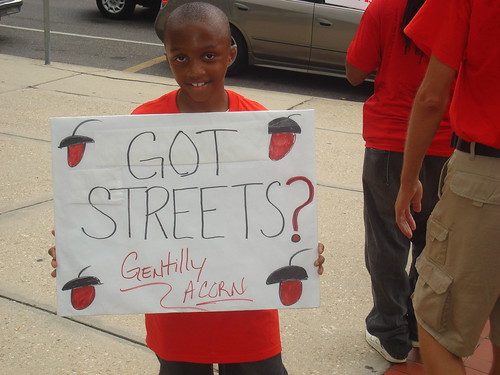 Don't Worry Kid, ACORN will never let you get a school voucher. The Street will always be there for you.
Don't Worry Kid, ACORN will never let you get a school voucher. The Street will always be there for you.


